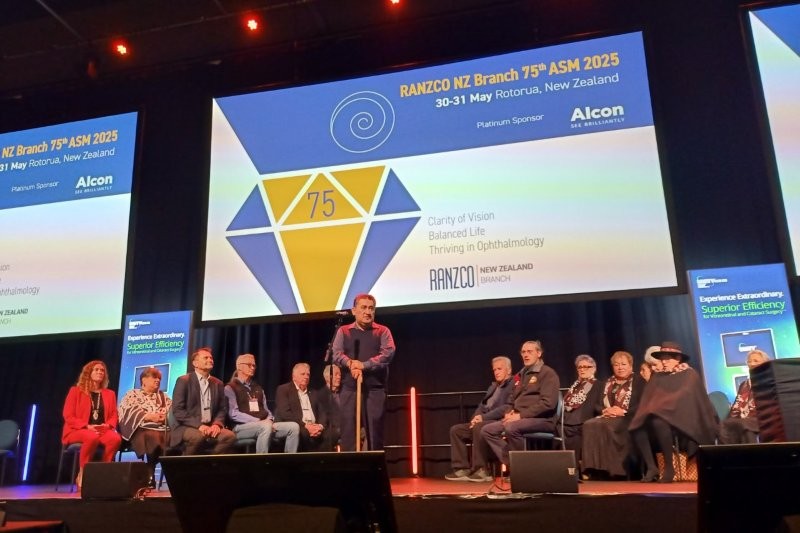Insights and delights
Auckland Eye’s popular Orakei Bay Events Centre dinner served up a healthy dose of insights alongside a delightful dinner. Many local optometrists attended the evening for networking and CPD with a side of Lipiview. I, for one, left feeling relieved to know my meibomian glands are in good nick.
Dr Dean Corbett kicked off proceedings with a talk on lifestyle intra ocular lenses (IOLs). Dr Corbett admitted he’s a stickler for terminology but said it’s crucial that the patient understands what surgeons are talking about. Using direct terms like ‘single focus’, rather than ‘monofocal’, and ‘lifestyle’ rather than ‘premium’, can be helpful in ascertaining patients’ visual outcome expectations.
With the wide range of IOL options now available, people choose to have replacement lens surgery earlier than before and Auckland Eye’s average age for patients having replacement lens surgery is sitting at 71, Corbett said. US numbers tell the same story, with an average age of 72 in 2010 having dropped to just 65 in 2018, he said. 18% of patients are now opting for lifestyle IOLs, compared to just 2% in 2010. Looking at these trends, Dr Corbett recommended optometrists acquire a solid, non-biased knowledge of the pros and cons of different lifestyle IOLs to optimise patient outcomes.
Dr Corbett also discussed the importance of a non-compromised ocular surface prior to any laser surgery and while dry eye disease is an uncurable, chronic and progressive disease, if treated effectively, symptoms can improve, he said. The dry eye discussion provided a natural Segway for Auckland Eye optometrist Surekha Parag to join Dr Corbett on stage to introduce Oasis Spa, a new offering created to provide diagnosis and treatment options for dry eye disease.
While the guests devoured a delicious dessert selection, Dr Justin Mora shared his experiences and thoughts on managing challenging patients and/or patients’ parents. He talked the audience through several reasons why a consultation might be challenging; it could be a resourcing issue, it could be the patient, or it could be you.
There are many reasons why the patient or parent might be challenging, and the key is to be empathic and reset the consultation if necessary, said Dr Mora. If a path forward appears unattainable, set boundaries, don’t accept bullying and ultimately inform the patient that they need to seek out a different doctor or optometrist if you’re not comfortable with the way it’s going, he said.
First impressions are always important, and Dr Mora suggested a few things clinicians can do to get it right. Always call the person by name and, if it is a child, invite them in as the key person. It might sound obvious, he said, but do introduce yourself properly to everyone in the room, as it gets a bit awkward referring to someone as “Ben’s mum” during the entire consultation. Be prepared and understand the reason for the visit, be mindful of cultural differences and always engage with the patient using eye contact and appropriate body language, he said.
Many patients are understandably anxious or distressed and Dr Mora suggested using the ICE triad (ideas, concerns and expectations) to address anxiety. Listen to their ideas, find out what they know, and educate them. Listen to their concerns and address each concern methodically. Find out what their expectations of the treatment are and provide realistic management options where possible.
In summary, Dr Mora encouraged the audience to be alert to signs indicating the consultation is heading in the wrong direction, remain open, responsive and encouraging, and reset if necessary. Ensure the patient understands the plan, takes responsibility and, preferably, try to have a low threshold for second opinions. If it still doesn’t go well, don’t take it personally, but do reflect on why and try and learn from it, Dr Mora concluded.
Separate box:
Participants wanted: PANDA study
Patients with newly diagnosed neovascular age-related macular degeneration (AMD) are required for a study evaluating the safety and efficacy of conbercept intravitreal injections (no cost to the patient). Patients are randomised to receive either conbercept or Aflibercept (EYLEA). For patient eligibility and more information, call 09 520 9138 or email clinical.research@aucklandeye.co.nz























